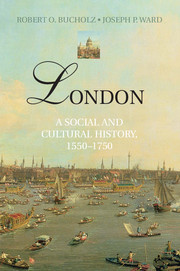Description
London
A Social and Cultural History, 1550–1750
Authors: Bucholz Robert O., Ward Joseph P.
This book is a history of London from 1550 to 1750, the period of its rise to world-wide prominence.
Language: English
Subject for London:
27.70 €
In Print (Delivery period: 14 days).
Add to cart
Publication date: 07-2012
438 p. · 16x23.5 cm · Hardback
438 p. · 16x23.5 cm · Hardback
Description
/li>Contents
/li>Biography
/li>
Between 1550 and 1750 London became the greatest city in Europe and one of the most vibrant economic and cultural centres in the world. This book is a history of London during this crucial period of its rise to world-wide prominence, during which it dominated the economic, political, social and cultural life of the British Isles, as never before nor since. London incorporates the best recent work in urban history, contemporary accounts from Londoners and tourists, and fictional works featuring the city in order to trace London's rise and explore its role as a harbinger of modernity, while examining how its citizens coped with those achievements. London covers the full range of life in London, from the splendid galleries of Whitehall to the damp and sooty alleyways of the East End. Readers will brave the dangers of plague and fire, witness the spectacles of the Lord Mayor's Pageant and the hangings at Tyburn, and take refreshment in the city's pleasure-gardens, coffee-houses and taverns.
Introduction: London's importance; 1. London in 1550; 2. The socioeconomic base; 3. Royal and civic London; 4. Fine and performing arts; 5. The public sphere and popular culture; 6. The people on the margins; 7. Riot and rebellion; 8. Plague and fire; Conclusion: London in 1750.
Robert O. Bucholz is Professor of History at Loyola University, Chicago. He is the co-author (with Newton Key) of Early-Modern England, 1485–1714: A Narrative History (2nd edition, 2009) and Sources and Debates in English History, 1485–1714 (2nd edition, 2009) and the co-editor (with Carol Levin) of Queens and Power in Medieval and Early Modern England (2009).
Joseph P. Ward is Associate Professor and Chair of the Department of History at the University of Mississippi. He is the author of Metropolitan Communities: Trade Guilds, Identity, and Change in Early Modern London (1997) and he was elected a Fellow of the Royal Historical Society in 2000.
Joseph P. Ward is Associate Professor and Chair of the Department of History at the University of Mississippi. He is the author of Metropolitan Communities: Trade Guilds, Identity, and Change in Early Modern London (1997) and he was elected a Fellow of the Royal Historical Society in 2000.
© 2024 LAVOISIER S.A.S.




